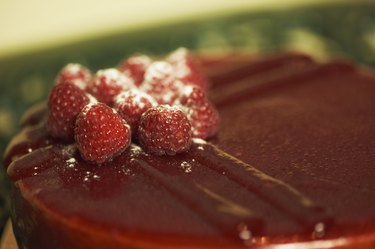 Poured ganache makes an elegant glaze for cakes. Image Credit: Jupiterimages/Stockbyte/Getty Images
Poured ganache makes an elegant glaze for cakes. Image Credit: Jupiterimages/Stockbyte/Getty Images
Although devotees of dark chocolate might disagree, most sweet-lovers find the richness of dairy products does good things for the flavor and texture of chocolate. One outstanding example of that beautiful marriage is ganache, a combination of cream and high-quality chocolate that's used in the pastry kitchen as a glaze, cake filling or even as centers for truffles. Its thickness varies with the ratio of chocolate to cream, and can easily be thinned if it's too thick.
Video of the Day
Smooth and Rich
Ganache is made by combining good-quality chocolate in varying percentages with boiling cream. A utilitarian, general-purpose ganache usually consists of 2 parts chocolate melted into 1 part cream, by weight. At this percentage, ganache can be poured over a cake as a glaze, cooled slightly and then whipped for icing or filling, or chilled and used as the filling in truffles. Equal parts chocolate and cream make a softer ganache, sometimes used as a filling in cakes, while 3 parts chocolate to 1 part of cream makes a thin, shiny glaze.
Check Your Temperature
When it's to be used as a glaze or filling, ganache is typically used at a temperature between 85 and 86 degrees Fahrenheit at the low end, and 90 to 91 F at the high end. If your ganache seems thicker than it should be, temperature is usually the first thing to check. Test its temperature with an instant-read thermometer inserted into the middle of the bowl, taking care that it doesn't touch the bowl itself. If your temperature is at or below 85 F, warm the ganache gently over a pan of hot — not boiling — water for a few seconds at a time, stirring frequently, until it thins to the correct temperature.
Thin It Physically
If temperature proves not to be the problem, your next option is to thin the ganache physically. The obvious ingredient to add is some extra cream, pre-heated to the same temperature as the ganache. If your ganache is just slightly thicker than you'd like, stir in cream, 1/2 tablespoon at a time, until it reaches the right consistency. If you're starting with a 3-to-1 ganache and want to make it a 2-to-1 ganache, weigh the correct amount of cream ahead of time and then heat it. You can also thin the ganache with small quantities of corn syrup or softened butter, which add a gentle sheen; or rum or liqueur, which add flavor.
Brand Matters
If you've made your ganache from a well-proven recipe and it's unexpectedly thick, sometimes the culprit is the chocolate you've used. Even among brands of comparable quality and cocoa content, melting characteristics can vary widely. For example Swiss-made Lindt dark chocolate melts to a thin and liquid consistency, while Belgian-made Callebaut is thicker and more viscous. Professional pastry chefs usually choose a favorite and stick with it, so they can count on a predictable result. At home, you don't need to be quite as exacting, but knowing the characteristics of your favorite brands can save you time and frustration.




